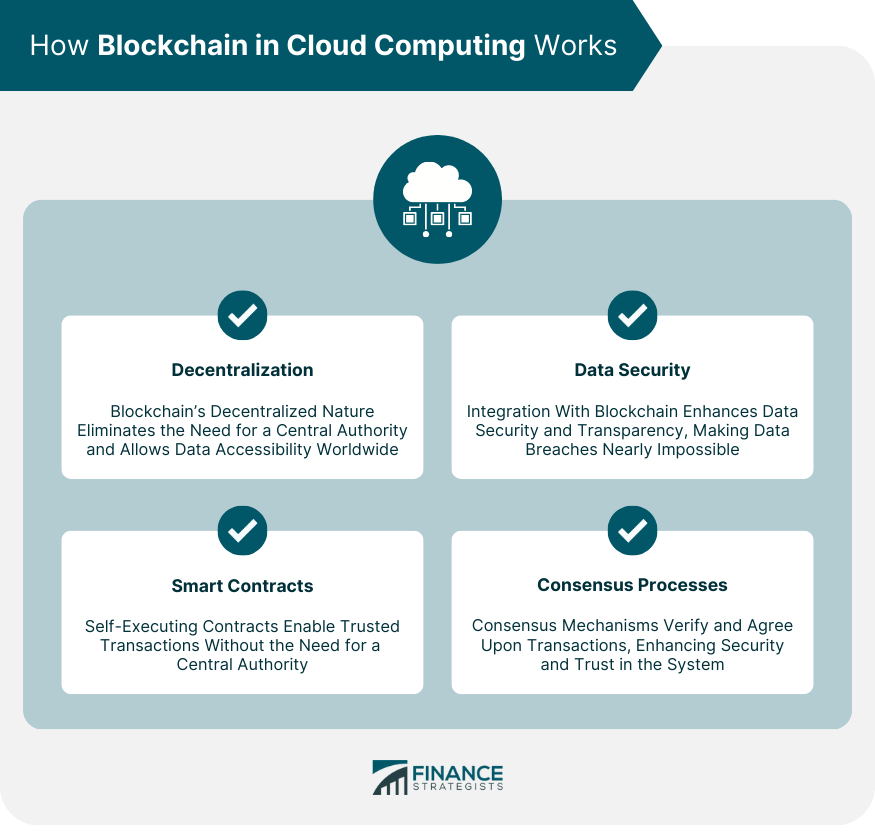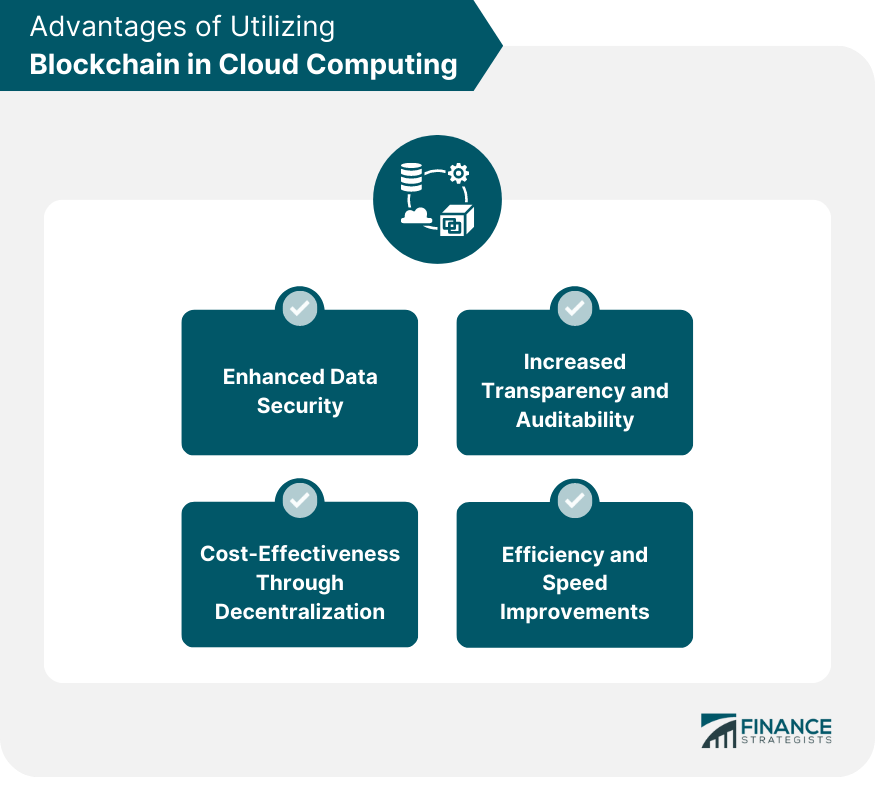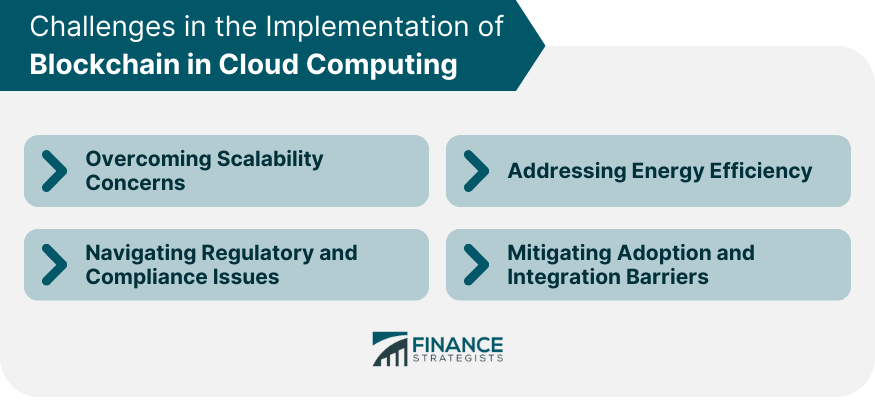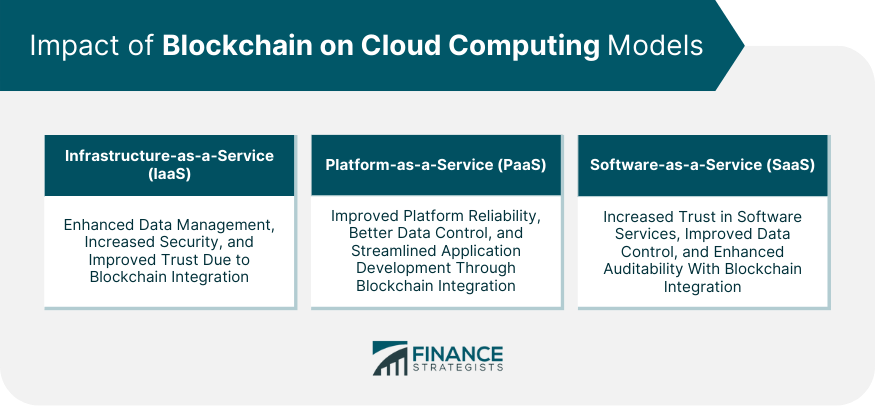Blockchain in Cloud Computing is an innovative approach that combines the principles of blockchain - such as decentralization, transparency, and immutability - with the scalability and accessibility of cloud computing. It fundamentally redefines how data is stored, and transactions are processed in the cloud. The primary purpose of integrating blockchain with cloud computing is to enhance data security, improve transparency, and streamline operations by eliminating intermediaries. By utilizing a decentralized and tamper-proof ledger for storing data, it becomes nearly impossible for data breaches to occur. Additionally, every transaction is recorded and can be tracked, thus increasing accountability and trust among users. This integration is not just transforming how businesses operate but is also creating new opportunities and efficiencies across various industries. Decentralization plays a significant role in this integration. By its design, blockchain technology operates on a decentralized network, removing the need for a central authority. This decentralization feature is merged with cloud computing to create a system where data is not only secure but also accessible from anywhere in the world. The integration of blockchain technology with cloud computing significantly enhances data security and transparency. The distributed ledger in blockchain allows the cloud's data to be stored in a tamper-proof manner, making data breaches nearly impossible. Furthermore, transactions recorded on the blockchain are transparent and can be tracked, leading to increased accountability. Smart contracts, which are self-executing contracts with terms of the agreement directly written into code, also play a crucial role in this integration. They allow trusted transactions and agreements to be carried out among disparate, anonymous parties without the need for a central authority or external enforcement mechanism. Finally, the consensus mechanisms utilized in blockchain technology contribute to the functionality of cloud computing. These mechanisms ensure that all transactions are verified and agreed upon by all participants, further bolstering the security and trustworthiness of the system. When it comes to integrating blockchain with cloud services, various approaches can be taken. Public, private, and hybrid cloud solutions can all be enhanced with the integration of blockchain technology. The choice among these options depends on the specific needs and requirements of the organization. The integration of blockchain and cloud computing is already transforming numerous industries. From supply chain management to healthcare, blockchain in cloud computing is enhancing data security, improving transparency, and streamlining operations. One of the most notable benefits of integrating blockchain with cloud computing is the significant improvement in data security. Blockchain's distributed ledger ensures that the data stored in the cloud is tamper-proof and highly resistant to cyberattacks. Blockchain's immutable and transparent nature also enhances auditability. All transactions and changes are recorded and can be viewed by authorized parties, fostering a high level of trust and transparency. Blockchain's decentralized nature eliminates the need for intermediaries in cloud computing, leading to cost reductions. It also allows for more efficient use of resources and reduces the risk of single-point failures. Through the use of smart contracts and automation, blockchain can significantly increase the speed and efficiency of cloud computing operations. This can result in considerable time and cost savings. Despite its numerous benefits, implementing blockchain in cloud computing also poses several challenges. One of the main hurdles is scalability. As the number of transactions increases, the computational power required to process and verify these transactions can also rise, leading to scalability issues. Another challenge is energy efficiency. The proof-of-work consensus mechanism used by many blockchains is computationally intensive and consumes a large amount of energy. The regulatory landscape for blockchain technology is still uncertain in many regions. Organizations must navigate this complex landscape to ensure their blockchain in cloud computing solutions are compliant with all relevant laws and regulations. Finally, there can be barriers to the adoption and integration of blockchain technology into existing cloud computing infrastructure. These barriers can include technical challenges, lack of understanding about blockchain technology, and resistance to change. Blockchain can significantly impact Infrastructure-as-a-Service (IaaS) models by providing a more secure and transparent method of managing and storing data. This can result in improved trust between parties and enhanced security. Similarly, Platform-as-a-Service (PaaS) models can benefit from the integration of blockchain. It can enhance the reliability of platforms, provide better control over data, and streamline the development of applications. Finally, Software-as-a-Service (SaaS) models can be transformed with blockchain integration. It can enhance the trustworthiness of software services, provide better control over data, and improve auditability. The integration of blockchain technology with cloud computing brings significant advancements in data security, transparency, and efficiency. By leveraging the principles of decentralization, tamper-proof storage, and smart contracts, blockchain enhances the trustworthiness of cloud-based transactions and data management. It provides enhanced data security, making breaches nearly impossible, and ensures transparency through the transparent and auditable nature of blockchain transactions. Moreover, the integration offers cost-effectiveness by eliminating intermediaries and improving resource utilization. The efficiency and speed of operations are heightened through the automation enabled by smart contracts. However, challenges such as scalability, energy consumption, regulatory compliance, and adoption barriers need to be addressed for widespread implementation. Nevertheless, the impact on different cloud computing models, including IaaS, PaaS, and SaaS, is profound. It enhances security, control over data, and trust in each of these models. As blockchain in cloud computing continues to evolve, it holds the potential to reshape industries, redefine trust, and revolutionize data management in the digital age.What Is Blockchain in Cloud Computing?
How Blockchain in Cloud Computing Works
Role of Decentralization
Data Security and Transparency
Mechanism of Smart Contracts
Consensus Processes

Integration of Blockchain With Cloud Services
Public, Private, and Hybrid Cloud Solutions
Real-World Applications and Use Cases
Advantages of Utilizing Blockchain in Cloud Computing
Enhanced Data Security
Increased Transparency and Auditability
Cost-Effectiveness Through Decentralization
Efficiency and Speed Improvements

Challenges in the Implementation of Blockchain in Cloud Computing
Overcoming Scalability Concerns
Addressing Energy Efficiency
Navigating Regulatory and Compliance Issues
Mitigating Adoption and Integration Barriers

Impact of Blockchain on Cloud Computing Models
Influences on Infrastructure-as-a-Service (IaaS)
Changes to Platform-as-a-Service (PaaS)
Alterations in Software-as-a-Service (SaaS)

Bottom Line
Blockchain in Cloud Computing FAQs
Blockchain in Cloud Computing is a fusion of blockchain technology with cloud computing, creating a secure, transparent, and decentralized method of storing data and conducting transactions. It leverages the principles of blockchain, such as immutability and decentralization, and combines them with the flexibility and scalability of cloud computing.
Blockchain enhances cloud computing in several ways. It improves data security by making the data stored in the cloud tamper-proof. It also increases transparency and auditability as all transactions are recorded and can be tracked. Through decentralization, it eliminates the need for intermediaries, reducing costs and improving resource efficiency. Lastly, the use of smart contracts can increase the speed and efficiency of cloud operations.
Implementing Blockchain in Cloud Computing comes with several challenges. One of the main hurdles is scalability, as the computational power required can increase with the number of transactions. Energy efficiency is another concern due to the computationally intensive nature of many blockchains. Regulatory uncertainty and compliance issues can also pose challenges. Finally, there can be barriers to adoption and integration, including technical difficulties, lack of blockchain understanding, and resistance to change.
Blockchain can profoundly impact all cloud computing models. For Infrastructure-as-a-Service (IaaS), it provides a secure and transparent method of managing and storing data. For Platform-as-a-Service (PaaS) enhances reliability, offers better control over data, and streamlines application development. In the case of Software-as-a-Service (SaaS), it can increase the trustworthiness of services, improve data control, and enhance auditability.
The integration of blockchain and cloud computing is already revolutionizing numerous industries. For instance, supply chain management it's enhancing transparency and streamlining operations. In healthcare, it's improving data security and patient privacy. The possibilities are vast and still being explored.
True Tamplin is a published author, public speaker, CEO of UpDigital, and founder of Finance Strategists.
True is a Certified Educator in Personal Finance (CEPF®), author of The Handy Financial Ratios Guide, a member of the Society for Advancing Business Editing and Writing, contributes to his financial education site, Finance Strategists, and has spoken to various financial communities such as the CFA Institute, as well as university students like his Alma mater, Biola University, where he received a bachelor of science in business and data analytics.
To learn more about True, visit his personal website or view his author profiles on Amazon, Nasdaq and Forbes.











